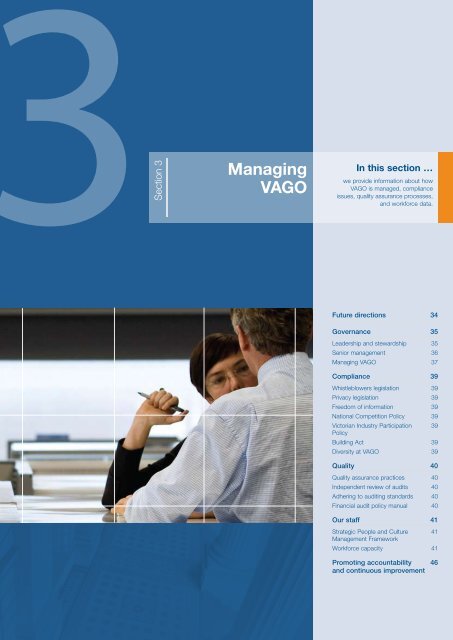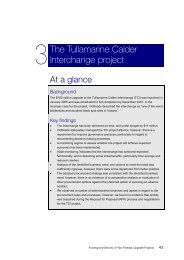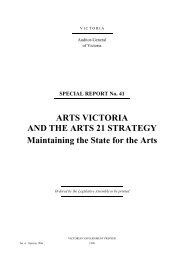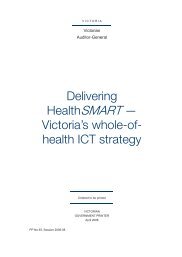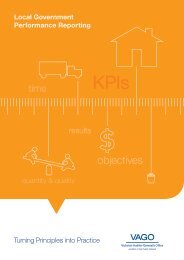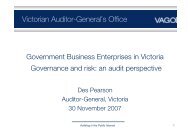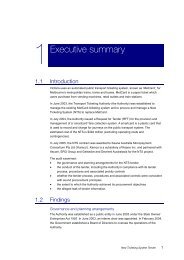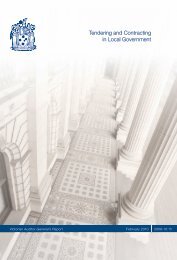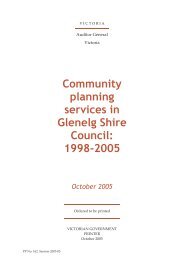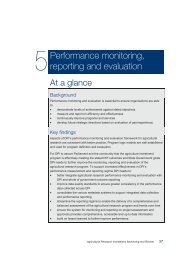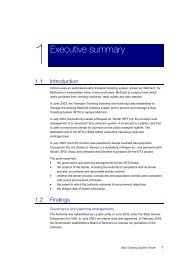You also want an ePaper? Increase the reach of your titles
YUMPU automatically turns print PDFs into web optimized ePapers that Google loves.
Section 3<br />
<strong>Managing</strong><br />
<strong>VAGO</strong><br />
In this section …<br />
we provide information about how<br />
<strong>VAGO</strong> is managed, compliance<br />
issues, quality assurance processes,<br />
and workforce data.<br />
Future directions 34<br />
Governance 35<br />
Leadership and stewardship 35<br />
Senior management 36<br />
<strong>Managing</strong> <strong>VAGO</strong> 37<br />
Compliance 39<br />
Whistleblowers legislation 39<br />
Privacy legislation 39<br />
Freedom of information 39<br />
National Competition Policy 39<br />
Victorian Industry Participation<br />
Policy<br />
39<br />
Building Act 39<br />
Diversity at <strong>VAGO</strong> 39<br />
Quality 40<br />
Quality assurance practices 40<br />
Independent review of audits 40<br />
Adhering to auditing standards 40<br />
Financial audit policy manual 40<br />
Our staff 41<br />
Strategic People and Culture<br />
Management Framework<br />
41<br />
Workforce capacity 41<br />
Promoting accountability 46<br />
and continuous improvement
Future directions<br />
[Table 14 ] Objectives and strategies<br />
Objectives Strategies<br />
• Being authoritative and relevant • Increasing transparency in performance audit topic selection<br />
34<br />
Annual Report 2008–09<br />
• Demonstrably applying materiality and risk criteria in topic selection<br />
• Emphasising the evidence and the application of authoritative criteria<br />
• Reporting clearly and unequivocally<br />
• Being highly regarded by Parliament • Engaging with parliamentary committees and parliamentarians to<br />
assure the relevance and appropriateness of our audits<br />
• Fostering productive relationships<br />
with audit clients<br />
• Strengthening relationships with PAEC<br />
and other parliamentary committees<br />
• Better informing our clients about our audit activities<br />
• Engaging early and consistently on audit issues and findings<br />
• Promoting continuous improvement in the Victorian public sector<br />
• Being an employer of choice • Demonstrating the relevance of <strong>VAGO</strong> to the public interest<br />
• Being innovative and cost-effective<br />
<strong>VAGO</strong>’s strategic plan identifies five objectives and related strategies, aimed at further improving<br />
our operations during the period 2007–08 to 2009–2010.<br />
• Continuously developing our people<br />
• Providing an attractive and stimulating work environment<br />
• Continuously improving our systems, methodologies and processes<br />
• Valuing ideas and knowledge sharing<br />
• Aligning tasks with office-wide objectives<br />
The performance indicators of our success in attaining our objectives are:<br />
• feedback from our various stakeholders, including parliamentarians, PAEC and client<br />
agencies<br />
• our performance compared with our peers<br />
• achievement against our annual plans tabled in Parliament, and our internal business<br />
plans<br />
• the level of acceptance of our recommendations<br />
• the timeliness of our audits<br />
•<br />
feedback from our employees.
Leadership and stewardship<br />
<strong>VAGO</strong> is committed to continually improving<br />
its service delivery. This means optimally<br />
using our resources. In September 2008<br />
there was a realignment of the financial<br />
and performance audit jobs and client<br />
relationships at director level to streamline<br />
the audit process and enhance our ability to<br />
deliver high-quality analysis.<br />
In October 2008 <strong>VAGO</strong> bade farewell to<br />
Stuart Kells, Assistant Auditor-General,<br />
Performance Audit. The Assistant Auditor-<br />
General of Financial Audit, Andrew Greaves,<br />
was appointed as Stuart’s replacement<br />
and Assistant Auditor-General of Policy,<br />
Planning and Technical (PPT), John Findlay,<br />
was appointed Assistant Auditor-General of<br />
Financial Audit.<br />
[FIGuRe 10 ] <strong>VAGO</strong> organisation chart<br />
Corporate Services<br />
Executive Director<br />
Jenni Lillingston<br />
Performance Audit<br />
Assistant Auditor–General<br />
Andrew Greaves<br />
As part of this change we reviewed the<br />
way strategic support was provided to the<br />
leadership and audit groups. In consequence<br />
support providers were aligned with the<br />
operational functions they assist. As a result,<br />
expert technical advice is now provided by<br />
teams within the Financial Audit Group, while<br />
the Performance Audit Group has taken on<br />
the development of <strong>VAGO</strong>’s annual plan and<br />
the selection of areas of performance audit<br />
interest.<br />
A new Policy and Coordination Directorate<br />
has been formed to provide policy, project<br />
and secretariat services directly to the<br />
Auditor-General and senior management,<br />
and to provide strategic support for the<br />
Auditor-General’s relationships with key<br />
stakeholders.<br />
The senior management structure is outlined<br />
in Figure 10.<br />
Auditor-General<br />
Des Pearson<br />
Chief Operating Officer<br />
Peter Frost<br />
Audit Operations<br />
Governance<br />
Audit Committee<br />
Policy and Coordination<br />
Directorate<br />
Director, Marco Bini<br />
Financial Audit<br />
Assistant Auditor–General<br />
John Findlay<br />
35
Senior management<br />
36<br />
Annual Report 2008–09<br />
Des Pearson, bbus, GradDip Mgt, FIPaa, FCPa, FaIM, FCa<br />
Auditor-General of Victoria<br />
Des Pearson was appointed Auditor-General of Victoria in October 2006. He was previously<br />
Auditor-General of Western Australia (1991–2006). He is responsible to the Victorian Parliament<br />
for exercising the audit powers and functions under the Constitution Act 1975 and the Audit Act<br />
1994.<br />
Peter Frost, ba, blitt, MPhil (Cambridge), Med, PhD (Harvard)<br />
Chief Operating Officer<br />
Peter commenced as Chief Operating Officer in January 2007. He has extensive public sector<br />
management experience, gained primarily in the Victorian public sector, higher education<br />
and with the Commonwealth Secretariat. He reports directly to the Auditor-General on the<br />
management and performance of office operations, and oversees our technical and audit<br />
operations activities, as well as our business support activities.<br />
andrew Greaves, bec, Ca<br />
Assistant Auditor-General—Performance Audit Group<br />
Andrew was previously Assistant Auditor-General—Financial Audit Group. Since October 2008<br />
he has led the Performance Audit Group, which is responsible for undertaking performance<br />
audits for Parliament.<br />
John Findlay, bbus (acc), Mbus (acc), llb, GradDip CSP, FCPa<br />
Assistant Auditor-General—Financial Audit Group<br />
John was previously Assistant Auditor-General—Policy, Planning and Technical Group. Before<br />
joining <strong>VAGO</strong> he held the position of Director, Audit Policy and Reporting in the Queensland<br />
Audit Office. Since October 2008 he has led the group that is responsible for providing a range<br />
of financial statement audit services, and he manages our contractual arrangements with<br />
audit service providers. The group is also responsible for preparing a number of parliamentary<br />
reports.<br />
Jenni lillingston, bbus (ec & Fin), GradDip (ec)<br />
Executive Director—Corporate Services Group<br />
Jenni commenced as Executive Director—Corporate Services Group at the end of 2007. She<br />
has a background in the Victorian and Commonwealth Governments, including Premier and<br />
Cabinet, Treasury and Finance and Commonwealth Department of Finance. The Corporate<br />
Services Group provides a range of specialist services that contribute and support the delivery<br />
of <strong>VAGO</strong> outputs, including organisational development, people management, communications,<br />
business planning, information technology and services, property and financial services.
<strong>Managing</strong> <strong>VAGO</strong><br />
The Senior Management Group and<br />
five committees managed <strong>VAGO</strong> during<br />
2008–09.<br />
Senior Management Group (SMG)<br />
The Auditor-General, Chief Operating Officer,<br />
and the leaders of the business groups are<br />
members of SMG, which meets monthly.<br />
The role of the SMG is to provide advice<br />
and counsel to the Auditor-General as part<br />
of the delivery of his statutory objectives<br />
as described in the Audit Act 1994. Key<br />
functions and responsibilities of SMG include:<br />
• overseeing the implementation of<br />
strategic directions and objectives<br />
• endorsing major policy, planning and<br />
budget initiatives<br />
• monitoring organisational performance,<br />
including the achievement of business<br />
plans<br />
• monitoring systems of risk management,<br />
internal control, codes of conduct and<br />
compliance<br />
• keeping abreast of critical<br />
whole-of-government issues and<br />
developments<br />
• fostering continuous improvement across<br />
<strong>VAGO</strong>.<br />
Operations Group<br />
The Chief Operating Officer and the leaders<br />
of the business groups are members of this<br />
group, which meets monthly.<br />
The role of this group is to facilitate and<br />
oversee the development of business<br />
improvements and projects in accordance<br />
with the SMG-approved business plans.<br />
The group also acts as a conduit between<br />
the business groups and SMG with one of<br />
its main tasks being to receive and review<br />
the draft SMG monthly management report<br />
prior to its submission at the subsequent,<br />
scheduled SMG monthly meeting.<br />
Executive Remuneration Committee<br />
This committee includes the Auditor-General,<br />
Manager, People and Culture, and an<br />
independent member, Mr Patrick O’Grady.<br />
This committee is responsible for <strong>VAGO</strong>’s<br />
remuneration policy which supports its<br />
strategic goals and business objectives<br />
and consistency of human resources<br />
management strategies and policies. The<br />
committee monitors the executive officer<br />
annual performance appraisal process and<br />
salary review.<br />
Learning and Development Steering<br />
Group<br />
The role of this group is to promote<br />
learning and development strategically and<br />
operationally as a critical component to<br />
achieve <strong>VAGO</strong>’s planned outcomes. This<br />
group is chaired by the Manager, People<br />
and Culture and has senior representatives<br />
from all of the <strong>VAGO</strong> business groups. It<br />
has an ongoing role to assist in providing<br />
and supporting a coordinated approach on<br />
people practices within <strong>VAGO</strong>.<br />
In 2008–09 the work of this group has been<br />
widened to include consultation across the<br />
organisation to inform the new learning and<br />
development framework. The learning and<br />
development framework is closely linked<br />
to the role capability framework and is part<br />
of the succession planning and retention<br />
polices within <strong>VAGO</strong>.<br />
Staff Consultation and Development<br />
Group<br />
This group has a rotating chair and includes<br />
8 representatives from across all levels and<br />
from all business areas, with the Executive<br />
Director, Corporate Services, representing<br />
the SMG.<br />
The primary objectives of this committee are<br />
to provide a direct channel of communication<br />
between management and staff on matters<br />
directly affecting the culture and business of<br />
<strong>VAGO</strong> and to promote a spirit of cooperation<br />
and understanding as we seek to increase<br />
operational effectiveness while also providing<br />
a stimulating and rewarding workplace.<br />
Audit Committee<br />
All committee members are independent,<br />
non-executive members appointed by the<br />
Auditor-General. They are Mr Mark Anderson<br />
(Chair), Mr Keith James, Ms Deirdre<br />
O’Donnell and Ms Joanna Perry.<br />
The Audit Committee independently advises<br />
the Auditor-General on the quality of internal<br />
controls, responsible resource management<br />
and whether internal financial reports are<br />
adequate. The committee monitors how we<br />
manage significant financial risks and reviews<br />
the results of internal and external audits and<br />
annual financial statements. It also monitors<br />
the processes and controls in place to assure<br />
we operate economically, efficiently and<br />
effectively in the delivery of our objectives.<br />
37
Risk management<br />
Attestation on compliance with<br />
the Australian/New Zealand Risk<br />
Management Standard<br />
I, Desmond Pearson, certify that the<br />
Victorian Auditor-General’s Office<br />
has critically reviewed the risk profile<br />
within the last 12 months and has<br />
robust risk management processes<br />
in place including internal control<br />
systems that enable the executive<br />
team to understand, manage and<br />
control risk exposures. These<br />
processes have been verified as<br />
being consistent with the Australian/<br />
New Zealand Risk Management<br />
Standard AS4360. <strong>VAGO</strong> has<br />
undertaken a Risk Framework<br />
Quality Review with the Victorian<br />
Managed Insurance Authority in line<br />
with our commitment in 2007–08.<br />
The Audit Committee agrees that<br />
this attestation is consistent with<br />
the Committee’s understanding<br />
of <strong>VAGO</strong>’s risk management<br />
policies and processes, based<br />
on the evidence, reports and<br />
communications provided to the<br />
Committee throughout the year.<br />
D D R Pearson<br />
Auditor-General<br />
25 August 2009<br />
38<br />
Annual Report 2008–09<br />
Audit Committee Chairman’s report (year ended 30 June 2009)<br />
The Audit Committee is appointed by the Auditor-General to assist in assuring that there are<br />
appropriate and effective accounting, auditing, internal control, business risk management,<br />
compliance and reporting systems operating within <strong>VAGO</strong>.<br />
The members of the Audit Committee, their qualifications and attendance at meetings, are set<br />
out below.<br />
Committee member<br />
Mark Anderson FCPA, MACS, GMAICD<br />
Chief Executive Officer, Doutta Galla Aged Services<br />
Keith James FCPA<br />
Partner, Hall & Wilcox Lawyers<br />
Deirdre O’Donnell MBA<br />
Ombudsman, Telecommunications Industry<br />
Ombudsman Ltd<br />
Joanna Perry MA, FICANZ, FICAEW<br />
Chair, Financial Reporting Standards Board (New<br />
Zealand) and Board Member, Australian Accounting<br />
Standards Board<br />
The Audit Committee operates in<br />
accordance with a charter which outlines the<br />
responsibilities of the committee. The main<br />
responsibilities of the committee are to:<br />
• review, assess and recommend to the<br />
Auditor-General the adoption of the<br />
annual financial report<br />
• review the policies and procedures in<br />
place for the development of the office’s<br />
annual plan<br />
• determine the scope of the internal audit<br />
function and review its effectiveness<br />
• oversee the effectiveness of the risk<br />
management plan<br />
• review the scope and quality of the<br />
external audit<br />
• review and monitor related-party<br />
transactions<br />
• review the committee’s role and<br />
responsibilities.<br />
In fulfilling these responsibilities, the Audit<br />
Committee has:<br />
• reviewed the annual financial report<br />
and recommended its adoption by the<br />
Auditor-General<br />
• reviewed the management response to<br />
the external audit management letter<br />
• reviewed the adequacy of the office’s<br />
policies and procedures in the<br />
development of its annual plan<br />
• reviewed the 3-year internal audit plan<br />
• received reports from the internal auditor<br />
who advised no significant weaknesses<br />
Meetings<br />
attended<br />
in the internal financial controls and risk<br />
management practices<br />
• reviewed the office’s risk management<br />
reports and noted that risks were being<br />
appropriately monitored and addressed<br />
by the office<br />
• monitored the progress by the<br />
office on the implementation of the<br />
recommendations from the 2007 PAEC<br />
Performance Audit on the office<br />
• reviewed and updated the Audit<br />
Committee charter to reflect the<br />
responsibilities of the committee.<br />
The Audit Committee has appropriate<br />
financial and industry expertise. All members<br />
are financially literate and have an appropriate<br />
understanding of the operation of the office.<br />
Mark Anderson (Chairman)<br />
25 August 2009<br />
Declaration of interests<br />
Meetings<br />
held<br />
4 4<br />
4 4<br />
3 4<br />
4 4<br />
All executive officers and business unit<br />
managers have completed statements<br />
declaring whether their interests, shares in,<br />
and other benefits from, business enterprises<br />
could give rise to a conflict of interest and<br />
there were no such conflicts.
Whistleblowers legislation<br />
The Whistleblowers Protection Act 2001 was<br />
introduced in Victoria on 1 January 2002.<br />
The legislation protects whistleblowers who<br />
disclose improper conduct by public officers<br />
and public bodies, and it sets up a system to<br />
investigate disclosed matters.<br />
Audit-related issues<br />
The Whistleblowers Protection Act 2001<br />
expressly excludes the Auditor-General from<br />
application of the whistleblowers legislation.<br />
Section 41 of the Whistleblowers Protection<br />
Act 2001 allows the Ombudsman to refer<br />
a disclosure to the Auditor-General, if<br />
appropriate. However, the Auditor-General<br />
decides whether or not to investigate, in<br />
accordance with powers under the Audit Act<br />
1994.<br />
During 2008–09, there were no matters<br />
referred to the Auditor-General by the<br />
Ombudsman for investigation under the<br />
authority of the Audit Act 1994.<br />
Administrative issues<br />
We have developed procedures for handling<br />
disclosures by whistleblowers. These<br />
procedures have been distributed to staff,<br />
and members of the public can request a<br />
copy. The Executive Director, Corporate<br />
Services is the office’s protected disclosure<br />
coordinator. There were no disclosures on<br />
administrative matters during 2008–09.<br />
Privacy legislation<br />
We work closely with the office of the<br />
Victorian Privacy Commissioner, as required,<br />
to make sure that our audits complement<br />
information privacy principles and legislation.<br />
Freedom of information<br />
The Audit Act 1994, section 20B, precludes<br />
us from disclosing information we gather<br />
during an audit to a third party, other than<br />
through reporting to Parliament. Section 20B<br />
of the Audit Act 1994 also precludes third<br />
parties from accessing any information and<br />
documents we hold.<br />
Our administrative processes, however,<br />
come under the state’s freedom of<br />
information legislation. We did not receive<br />
any applications under this legislation in<br />
2008–09.<br />
National Competition Policy<br />
<strong>VAGO</strong> is compliant with National<br />
Competition Policy, including compliance<br />
with requirements of the policy statement<br />
Competitive Neutrality: A Statement of<br />
Victorian Government Policy, Victorian<br />
Government Timetable for the Review of<br />
Legislative Restrictions on Competition, and<br />
any subsequent reforms.<br />
Victorian Industry<br />
Participation Policy<br />
In October 2003 the Victorian Parliament<br />
passed the Victorian Industry Participation<br />
Policy Act 2003 that requires public<br />
bodies and departments to report on the<br />
implementation of the Victorian Industry<br />
Participation Policy (VIPP). Departments<br />
and public bodies are required to apply<br />
VIPP in all tenders of more than $3 million<br />
in metropolitan Melbourne and $1 million<br />
in regional Victoria. The office completed<br />
no tenders or contracts to which the VIPP<br />
applied during the reporting period.<br />
Building Act<br />
<strong>VAGO</strong> does not own or control any<br />
government buildings and, therefore, has no<br />
responsibilities in relation to the Building Act<br />
1993.<br />
Compliance<br />
Diversity at <strong>VAGO</strong><br />
<strong>VAGO</strong> continued to value diversity in<br />
the workplace during 2008–09. The<br />
‘equity, diversity and our values’ key<br />
result area in our Strategic People<br />
and Culture Management Framework<br />
reinforces <strong>VAGO</strong>’s commitment to<br />
fair and reasonable treatment for our<br />
people and our clients through:<br />
• living our values<br />
• valuing diversity<br />
• applying merit<br />
• recognising and respecting<br />
human rights<br />
• providing reasonable avenues of<br />
redress.<br />
This commitment was supported<br />
during the year by:<br />
• delivering learning and<br />
development opportunities in<br />
merit and equity for people with<br />
and without people management<br />
responsibilities<br />
• incorporating diversity strategies<br />
and principles into the Strategic<br />
People and Culture Management<br />
Framework<br />
• collecting diversity information<br />
from our staff survey to further<br />
inform diversity strategies in<br />
2009–10.<br />
Information collected indicated that<br />
of employees who responded to the<br />
survey:<br />
• 28.4 per cent were born in<br />
countries outside Australia<br />
• 34.1 per cent have a non-English<br />
speaking background<br />
• 12 languages other than English<br />
are spoken<br />
• 47.7 per cent speak at least one<br />
language other than English.<br />
39
Quality<br />
An ACAG meeting held in <strong>VAGO</strong>’s office.<br />
40<br />
Annual Report 2008–09<br />
Quality assurance practices<br />
We are committed to best practice in<br />
conducting audits. We aim to continually<br />
raise our standards to better meet the needs<br />
of Parliament and audited agencies.<br />
Our quality assurance practices include a<br />
number of external review procedures:<br />
• an independent performance audit of<br />
<strong>VAGO</strong> conducted every three years, with<br />
the auditor appointed by Parliament (see<br />
results in Appendix 1). The next audit is<br />
due in late 2010.<br />
• an independent review of a sample of<br />
completed financial and performance<br />
audits to confirm that they follow<br />
professional auditing standards and the<br />
Auditor-General’s policies. These reviews<br />
are conducted by audit professionals<br />
from other Australian audit offices<br />
• reviews of selected parliamentary reports<br />
by independent experts<br />
• independent surveys of members of<br />
Parliament and audited agencies, seeking<br />
feedback on the quality of our audits.<br />
Adhering to auditing<br />
standards<br />
In addition to our quality assurance practices,<br />
the office fulfils its professional and legal<br />
requirements to adhere to auditing standards.<br />
Under the Audit Act 1994, we must follow<br />
Australian Auditing Standards issued by the<br />
Auditing and Assurance Standards Board.<br />
The Act also enables the Auditor-General to<br />
apply additional auditing standards to the<br />
conduct of audits.<br />
We comply with auditing standards and<br />
policies and safeguard the quality of our<br />
audits by:<br />
• involving senior officers in all phases of<br />
the audit, including approving the plan<br />
and reviewing significant matters arising<br />
from each audit<br />
• requiring senior staff to review audit<br />
results to confirm that the audit meets<br />
professional standards<br />
• having senior officers external to the audit<br />
team assigned to all high-risk audits to<br />
confirm the quality of the audit.<br />
These measures also identify key issues<br />
and, where necessary, draw the attention<br />
of Parliament and agencies to important<br />
financial management and accountability<br />
issues and any inconsistencies in financial<br />
reporting.
Strategic People and Culture<br />
Management Framework<br />
The <strong>VAGO</strong> Strategic Plan identifies five key<br />
result areas (KRAs) for the organisation as<br />
a whole, including being an employer of<br />
choice. The strategies outlined in the plan to<br />
achieve these KRA are to demonstrate the<br />
relevance of the office to the public interest,<br />
continuously develop our people and to<br />
provide an attractive and stimulating work<br />
environment.<br />
To help achieve this objective, a Strategic<br />
People and Culture Framework was<br />
developed during 2007–08 and implemented<br />
during 2008–09. The framework identifies six<br />
key result areas:<br />
1. The Right People<br />
2. A High Performance Culture<br />
3. Planned Learning and Development<br />
[TABle 15 ] Employee numbers at 30 June 2009<br />
Year<br />
Number<br />
(Headcount)<br />
Ongoing employees<br />
Full-time<br />
(Headcount)<br />
4. Responsive Employment Conditions<br />
5. Equity, Diversity and Our Values<br />
6. Evaluation and Systems Improvement.<br />
The framework will assist our objective to be<br />
an employer of choice and enable a strategic<br />
and proactive approach to our culture, our<br />
people management practices, and our<br />
working conditions.<br />
Policies have been created within each key<br />
result area, and are available on the <strong>VAGO</strong><br />
intranet for staff information.<br />
Workforce capacity<br />
Our staffing profile<br />
<strong>VAGO</strong> staff numbers are reported, below,<br />
in accordance with the financial reporting<br />
direction FRD 29.<br />
Fixed-term<br />
and casual<br />
Part-time<br />
(Headcount) FTE FTE<br />
2007 143 132 11 139.6 3.8<br />
2008 136 125 11 132.8 15.7<br />
2009 142 132 10 139.2 10.0<br />
Our staff<br />
41
[Table 16 ] Employee profile<br />
Gender<br />
42<br />
Number<br />
(headcount)<br />
Ongoing<br />
Annual Report 2008–09<br />
3
Executive information<br />
[Table 18 ] Number of executive officers classified into ‘ongoing’ and ‘special projects’ at 3
44<br />
Annual Report 2008–09<br />
Industrial relations<br />
<strong>VAGO</strong> continues to maintain positive<br />
industrial relations outcomes with no disputes<br />
lodged either internally or with the Australian<br />
Industrial Relations Commission. During the<br />
year, there was no lost time due to industrial<br />
disputes.<br />
Certified agreement<br />
All non-executive employees are employed<br />
under the Victorian Public Service Agreement<br />
2006, 2009 Extended and Varied Version.<br />
All of <strong>VAGO</strong>’s policies have been reviewed<br />
and all amendments incorporated to include<br />
any changes as a result of the extended<br />
agreement.<br />
Code of conduct<br />
Our code of conduct, which incorporates the<br />
Victorian public service’s code of conduct for<br />
employees in the Victorian public sector, is<br />
applicable to all staff.<br />
Upon commencement with the office, all staff<br />
are given a copy of and required to sign their<br />
agreement to abide by the ‘Code of Conduct<br />
for Victorian Public Sector Employees of<br />
Special Bodies’.<br />
Merit and equity<br />
We maintain the following programs and<br />
policies to ensure that our workplace remains<br />
free from discrimination:<br />
• a merit and equity policy to promote and<br />
support diversity throughout <strong>VAGO</strong><br />
• an employee assistance program that<br />
gives staff professional and confidential<br />
counselling on work-related or personal<br />
problems that affect their work<br />
• a code of conduct to help staff<br />
understand the behavioural standards<br />
they must meet as officers of the public<br />
service<br />
• staff induction training, with information<br />
on anti-discrimination laws, expected<br />
behaviours and the complaints process.<br />
Occupational health and safety<br />
Occupational health and safety (OH&S)<br />
management has been updated to<br />
emphasise individual health, including a<br />
specifically designed strategy to identify<br />
and manage hazards associated with<br />
psychological health. Activities in 2008–09<br />
included:<br />
• continuing OH&S workplace inspections<br />
of all areas of the workplace in addition to<br />
off-site agency workplaces as necessary,<br />
•<br />
•<br />
to identify hazards and agree on solutions<br />
to remove or minimise them<br />
free flu vaccination program<br />
implementing the OH&S Committee<br />
and appropriate health and safety<br />
representative training for key OH&S<br />
Committee members.<br />
Environment Management<br />
Committee<br />
The Environment Management Committee<br />
(EMC) aims to improve, monitor and report<br />
the environmental performance of the office.<br />
Meetings have been held on a monthly<br />
basis throughout 2008–09 and committee<br />
members have worked hard, both in these<br />
meetings and individually, to achieve the aims<br />
of the EMC and <strong>VAGO</strong>.<br />
The main activity of the EMC in 2008–09,<br />
which was also part of <strong>VAGO</strong>’s commitment<br />
to the ResourceSmart program, was<br />
developing an Environmental Action Plan,<br />
to assist in achieving <strong>VAGO</strong>’s environmental<br />
targets and in meeting whole-of-government<br />
environmental goals, targets and objectives.<br />
This document is a blueprint which breaks<br />
down the targets into manageable steps and<br />
assigns responsibility, resources (both staff<br />
and financial) and a timescale to achieve<br />
each step. The Senior Management Group<br />
approved the Environmental Action Plan and<br />
it was submitted to Sustainability Victoria’s<br />
ResourceSmart group in June 2009.<br />
Throughout 2008–09 the EMC engaged in a<br />
number of activities to promote environmental<br />
awareness and empower staff members to<br />
assist in achieving <strong>VAGO</strong>’s environmental<br />
targets. These included:<br />
• regular presentations at the monthly Staff<br />
Communications Meetings, for example,<br />
think before you print, reduction in energy<br />
consumption, etc.<br />
• participation in environment events, for<br />
example, Earth Hour<br />
• ensuring signage is around the office to<br />
promote environmental awareness<br />
• change agent training for the EMC<br />
members<br />
• updating the environment policy to<br />
include references to external parties<br />
and extend the policy beyond the office<br />
environment at <strong>VAGO</strong>.<br />
The main tasks for the EMC in 2009–10 will<br />
be the implementation of the Environmental<br />
Action Plan and looking for new opportunities<br />
that may arise, which have not yet been<br />
identified or included in our current plan.
<strong>VAGO</strong> Social Club<br />
<strong>VAGO</strong>’s very active social club creates opportunities for staff to socialise beyond work and<br />
work hours. <strong>VAGO</strong> teams participate in bike rides, corporate games, indoor cricket and other<br />
individual and team sports. Club members also have access to various discounts, and are<br />
involved in a number of fundraising activities, such as sponsoring a child in Uganda.<br />
45
Promoting accountability and<br />
continuous improvement<br />
[Table 22 ] Auditor-General presentations, 2008–09<br />
46<br />
Annual Report 2008–09<br />
As part of our commitment to promoting<br />
improvement in the public sector, we look<br />
for opportunities to share lessons from<br />
our audits with government, peak bodies,<br />
individual agencies and the general public.<br />
During the year, the Auditor-General and<br />
a number of staff presented at a range of<br />
conferences and to professional bodies<br />
and industry groups. These included<br />
presentations on specific audits conducted<br />
by <strong>VAGO</strong>, as well as more wide-ranging<br />
matters that affect the public sector generally,<br />
such as governance, asset management and<br />
business systems (see Table 22).<br />
This year, the Auditor-General delivered<br />
keynote addresses at national and<br />
international events on topics, including<br />
the importance of record keeping for<br />
Date Presentation to Topic<br />
accountability, managing infrastructure<br />
assets for public value and the challenges to<br />
independence in a changing service delivery<br />
landscape.<br />
We also value the opportunity to promote<br />
performance and accountability to new<br />
entrants to the Victorian public sector.<br />
In 2008–09 the Victorian branch of the<br />
Institute of Public Administration Australia<br />
(IPAA) has included presentations by the<br />
Auditor-General and <strong>VAGO</strong> staff as a<br />
regular feature in their ‘How Governments<br />
Work’ course, aimed at participants new to<br />
government. In December 2008 some of our<br />
younger audit staff presented to the Victorian<br />
public sector graduate program, emphasising<br />
the importance of accountability and<br />
encouraging them to embrace and learn from<br />
audits and reviews across their careers.<br />
24-July-2008 16th Annual Congress on Archives—Kuala Lumpur Archives, Auditors and Accountability: Strategic Alliances<br />
13-Aug-2008 Launch of Deloitte Survey Report Introduction speech—’Mastering Finance in Government:<br />
Transforming the Government Enterprise through better Financial<br />
Management’<br />
21-Aug-2008 Victoria University ‘Public sector audit in the 21st Century—Where are we heading?’<br />
28-Aug-2008 <strong>VAGO</strong>/DTF/ANZSOG launch - Smarter Investments for<br />
Better Public Sector Outcomes<br />
11-Sep-2008 Australia New Zealand School of Government - Annual<br />
Conference 2008—Making Federalism Work<br />
19-Nov-2008 Australian Health Services Finance Managers National<br />
Conference 2008<br />
Launch of Investing Smarter in Public Sector ICT<br />
Evaluation and Review<br />
Checks & balances: Insights from audits in Victoria’s health sector<br />
01-Dec-2008 Kyneton Rotary Club Parliament’s Auditor—Role and Perspectives<br />
04-Dec-2008 Department of Justice Executive Forum Parliament’s Auditor—Role and Perspectives<br />
20-Jan-2009 IPAA Victoria—How Government Works Parliament’s Auditor—Role and Perspectives<br />
09-Feb-2009 WBI/CPA/LaTrobe Summer School WBI/CPA/LaTrobe Fourth Residential Summer School for Public<br />
Accounts Committees<br />
23-Feb-2009 IPAA/Department of Planning & Community<br />
Development—How Government Works<br />
11-Mar-2009 Cooperative Research Centre for Integrated<br />
Engineering Asset Management, Canberra<br />
16-Apr-2009 10th Biennial Conference of the Australasian Council of<br />
Public Accounts Committees, Wellington, NZ<br />
Parliament’s Auditor—Role and Perspectives<br />
<strong>Managing</strong> infrastructure assets: an audit perspective<br />
Issues for maintaining independence: A survey of Australia’s public<br />
audit legislation<br />
21-Apr-2009 Essendon Rotary Club Parliament’s Auditor—Role and Perspectives<br />
04-May-2009 Privacy Victoria Launch of Privacy Awareness Week<br />
07-May-2009 Monash University, Monash Governance Research Unit Parliament’s Auditor—Role & Perspectives<br />
24-June-2009 ICAA Regional Council Meeting Current issues in public sector audit
In addition to presentations and addresses,<br />
we leverage our audit role in other ways to<br />
promote improvements in accountability<br />
and performance, providing comments to<br />
parliamentary bodies and government on<br />
draft legislation, new proposals for financial<br />
management and intended changes to<br />
financial reporting frameworks.<br />
During 2008–09, we welcomed the<br />
opportunity to provide comment to the<br />
Department of Education and Early<br />
Childhood Development on accountability<br />
issues around proposed new higher<br />
education legislation.<br />
<strong>VAGO</strong> also continued to work closely with the<br />
Department of Treasury and Finance and the<br />
Public Accounts and Estimates Committee<br />
(PAEC) to assist them in advising government<br />
on the review of the Financial Management<br />
Act 1994 and related legislation. The PAEC<br />
report on their inquiry: New Directions<br />
in Accountability, picked up many of our<br />
suggestions of areas for improvement,<br />
including a greater focus on performance<br />
reporting, need for clarity of the coverage of<br />
public finance legislation and the importance<br />
of timely annual reports.<br />
We liaised with government agencies on<br />
significant financial reporting issues and<br />
on new and revised Minister for Finance,<br />
Financial Reporting Directions, which<br />
set out the requirements for financial<br />
management and reporting in the Victorian<br />
public sector. We continued to provide<br />
significant input to central agencies on a<br />
range of financial reporting issues, including<br />
the upcoming adoption of the Reporting<br />
Standard Harmonising Government Finance<br />
Statistics and generally accepted accounting<br />
principles.<br />
Building on our core audit program, these<br />
communication and liaison activities provide<br />
us with the opportunity to share lessons from<br />
our audits, promote improvement and drive<br />
improvements in accountability in Victoria.<br />
Contributions to the Australasian<br />
Council of Auditors-General<br />
In 2008–09 <strong>VAGO</strong> took a prominent role<br />
in the development of public sector audit<br />
nationally and internationally, through our<br />
participation in the Australasian Council of<br />
Auditors-General (ACAG).<br />
The Auditor-General attended two ACAG<br />
meetings in Brisbane in November 2008 and<br />
in Wellington in April 2009. These meetings<br />
provide a forum for Auditors-General to<br />
exchange information and views on matters<br />
of common interest and to oversee ACAG’s<br />
activities and the administration of its affairs.<br />
Through ACAG, <strong>VAGO</strong> made significant<br />
contributions to two submissions to<br />
parliamentary inquiries into audit legislation in<br />
Tasmanian and Commonwealth jurisdictions.<br />
Another key event for <strong>VAGO</strong>’s involvement<br />
with ACAG was our contribution to the<br />
annual conference of the Australasian<br />
Council of Public Accounts Committees. The<br />
Auditor-General addressed the conference<br />
on our research applying the international<br />
Pictured above from L-R: Members of the Australasian Council of Auditors-General: Phillipa Smith (NZ), Mike Blake (Tasmania), Colin Murphy (WA), Peter Achterstraat (NSW),<br />
Des Pearson (Vic), Frank McGuiness (NT), Mr Peter Siperau (PNG), Glenn Poole (QLD), Tu Pham (ACT)<br />
47
48<br />
Annual Report 2008–09<br />
best practice principle of independence to<br />
Australian audit legislation, stimulating debate<br />
and discussion on the impact of new service<br />
delivery mechanisms on accountability and<br />
audit.<br />
Office representatives also participated in a<br />
range of sub-groups, including:<br />
• heads of performance audit<br />
• information systems audits<br />
• practice management<br />
• quality assurance<br />
• financial reporting and auditing<br />
committee.<br />
These networks provide important<br />
opportunities for our staff to share views, and<br />
influence the national agenda on issues of<br />
significanc3 to <strong>VAGO</strong>. Using these networks,<br />
we collected comparative information<br />
on topics such as the application of new<br />
accounting standards for infrastructure<br />
assets and performance assessment for<br />
audit committees.<br />
A key sub-group focus in 2008–09 has been<br />
the joint ACAG Quality Assurance project,<br />
a shared quality framework to enable audit<br />
offices to self- and peer-assess against key<br />
internal and external quality requirements,<br />
ahead of any external audit or compliance<br />
requirements. <strong>VAGO</strong> piloted this framework,<br />
and was an active member of the ACAG<br />
working group that finalised the toolkit in<br />
March 2009.<br />
International liaison<br />
<strong>VAGO</strong> has a history of providing support for<br />
audit offices and parliaments of countries<br />
seeking to develop their capacity to improve<br />
accountability within their jurisdictions.<br />
In August 2008 we again participated in CPA<br />
Australia’s International Partnership Program,<br />
funded through AusAid. <strong>VAGO</strong> offered<br />
participants from Samoa, Vietnam, Papua<br />
New Guinea and Laos an orientation on the<br />
role of the Auditor-General and our approach<br />
to Parliament’s audit mandate.<br />
The Auditor-General took part in the World<br />
Bank Institute/Commonwealth parliamentary<br />
Association’s February ‘Summer School’<br />
for Public Accounts Committee members,<br />
leading a session with participants from ten<br />
countries across the Asia-Pacific region.<br />
In March 2009, we hosted two delegations<br />
from the Chinese National Audit Office,<br />
offering training on our approaches<br />
to performance auditing and auditing<br />
information systems.<br />
Secondments and internships are also a<br />
significant part of our international liaison<br />
approach. In 2008–09, <strong>VAGO</strong> has hosted<br />
four auditors from the office of the Maldives<br />
Auditor-General, giving them a broad range<br />
of experience on financial and performance<br />
audit teams, across metropolitan and<br />
regional audits.<br />
In addition to this capacity-building work,<br />
<strong>VAGO</strong> has built our own awareness of<br />
international good practice through hosting a<br />
visit from Errol Price, Deputy Auditor-General<br />
of British Columbia, in March 2009. Whilst<br />
at the office, Mr Price shared the outcomes<br />
of a recent re-engineering initiative for British<br />
Columbia’s performance audit program,<br />
discussed the potential for secondment and<br />
exchange arrangements for audit staff and<br />
shared Canadian directions in public sector<br />
performance reporting.<br />
Overseas travel<br />
From 23 to 25 July 2008 Des Pearson<br />
attended the International Congress on<br />
Archives in Kuala Lumpur and presented a<br />
paper in the session ‘Archives, Auditors and<br />
Accountability: Strategic Alliances.<br />
Between 3 and 5 September 2008<br />
Marco Bini attended the 5th International<br />
Conference of Accounting, Auditing and<br />
Management in Public Sector Reform<br />
organised by the European Institute for the<br />
Advanced Study of Management to deliver<br />
a paper, ‘Piecing together the fragments:<br />
Statutory Government in Victoria—a new<br />
approach.’ In the UK he visited the National<br />
Audit Office. He also visited the Dutch Court<br />
of Audit in Amsterdam.<br />
From 14 to 17 April 2009 Des Pearson<br />
attended a meeting of the Australasian<br />
Council of Auditors-General in Wellington<br />
and also participated in the Tenth Biennial<br />
Conference of the Australasian Council of<br />
Public Accounts Committees.<br />
In May 2009 Jenni Lillingston attended the<br />
Government Information System Managers’<br />
Forum and consulted with the New Zealand<br />
Audit Office in Wellington.<br />
4


